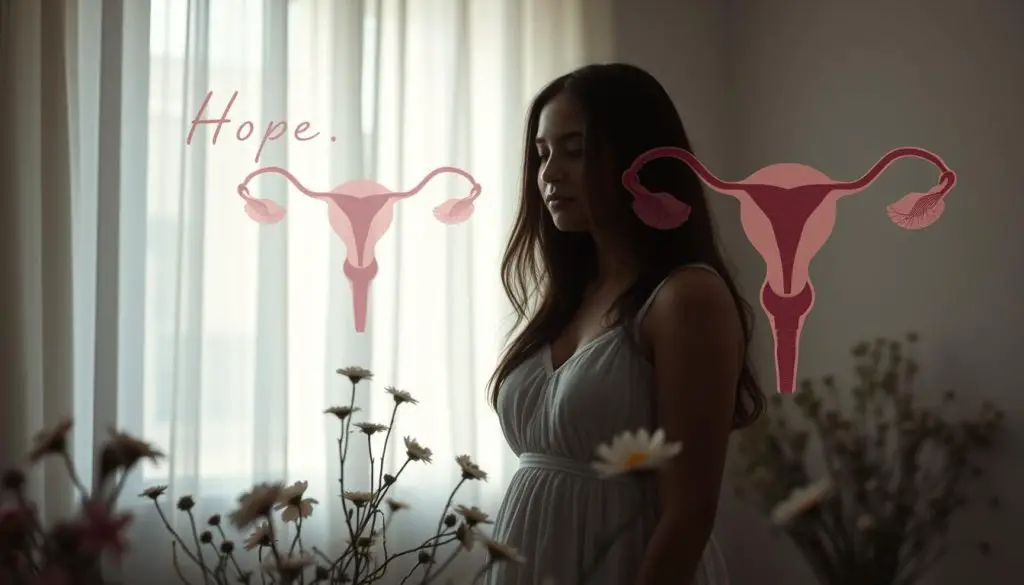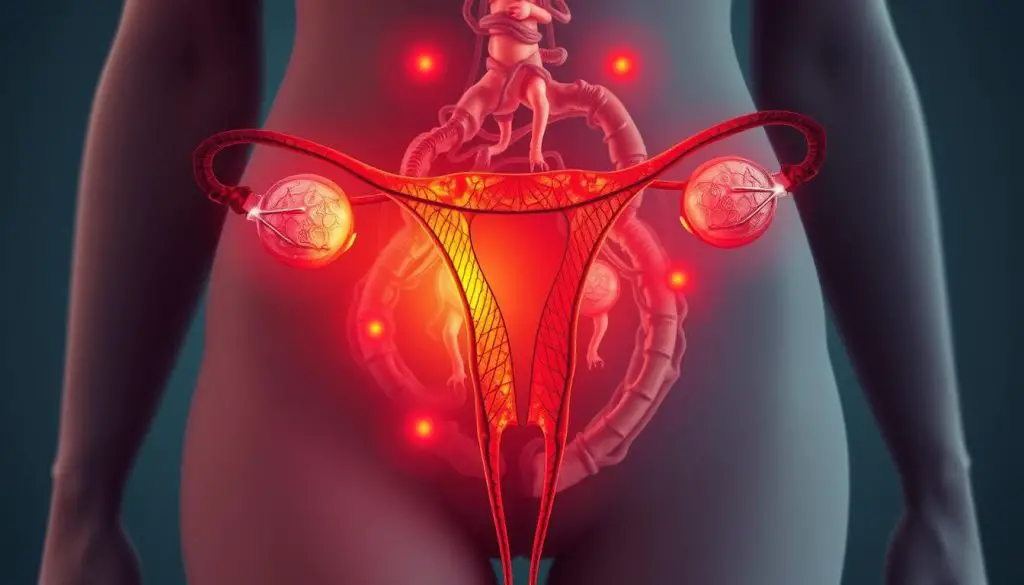Ever wondered why your period pain focuses on your ovaries? If you have endometriosis, it’s because this condition affects your reproductive organs in a special way. Endometriosis causes a unique pelvic pain, often felt most in your ovaries. This leaves you wondering, “Why do I experience ovary pain during my period with endometriosis?”
Learning about the link between endometriosis and ovarian pain is key to feeling better. With the right info and medical help, you can manage your symptoms and improve your life. So, let’s explore why endometriosis can cause such severe ovary pain during your period.
What is Endometriosis?
Endometriosis is a chronic condition that affects 7% to 15% of women worldwide. It happens when tissue inside the uterus grows outside of it. This tissue can grow on the ovaries, fallopian tubes, and even the bladder or intestines.
Understanding the Condition
The tissue outside the uterus acts like the uterine lining. It thickens, breaks down, and bleeds with each cycle. But, it can’t leave the body, causing inflammation and scarring.
This leads to adhesions, bands of scar tissue. These can make the pelvic organs stick together.
Endometriosis and Ovarian Cysts (Endometriomas)
Endometriosis often causes the growth of endometriomas, or ovarian cysts filled with endometrial tissue. These cysts, known as “chocolate cysts,” can cause severe pain. They may also affect fertility.
Endometriosis affects a person’s physical, emotional, and mental health. Knowing about this disease is the first step to finding the right treatment and support.
Who is at Risk for Endometriosis?
Endometriosis can affect people of all ages. Certain factors may raise the risk of getting this condition. Knowing these risk factors helps both individuals and healthcare providers manage it better.
Risk Factors for Endometriosis
Several key factors have been identified as possible contributors to endometriosis:
- Family History: If a close relative, like a mother, sister, or daughter, has endometriosis, your risk goes up.
- Early Menstruation: Starting your period early, before 11, increases your risk.
- Frequent Menstrual Cycles: Cycles that happen more often than every 28 days may raise your risk.
- Never Giving Birth: Those who have never had children are more likely to get endometriosis.
- Heavy, Prolonged Periods: Having long, heavy periods that last over seven days is common in those with endometriosis.
Other factors like a lower body mass index and higher estrogen levels can also contribute. Issues with the reproductive organs that block menstrual blood flow play a role too.
| Risk Factor | Impact on Endometriosis |
|---|---|
| Family History | Significantly increases the risk of developing endometriosis |
| Early Menstruation (before age 11) | Associated with a higher risk of endometriosis |
| Frequent Menstrual Cycles (less than 28 days) | May contribute to the development of endometriosis |
| Never Giving Birth | Individuals who have never given birth are more likely to experience endometriosis |
| Heavy, Prolonged Periods (longer than 7 days) | More common in individuals with endometriosis |
Knowing these risk factors helps in being proactive about managing endometriosis. This can lead to earlier diagnosis and better outcomes.
Common Symptoms of Endometriosis
Pelvic Pain Beyond Normal Menstrual Cramps
Endometriosis is a chronic condition that affects about 10% of women of childbearing age. It causes pelvic pain that’s worse than regular menstrual cramps. Women often feel severe, crippling cramps that start before and last after their period.
This pain can spread to the lower back and stomach. In addition to painful periods, endometriosis can lead to other symptoms like:
- Painful intercourse
- Pain with bowel movements or urination
- Heavy and prolonged periods
- Infertility
Some people with endometriosis also feel tired, constipated, bloated, and nauseous, mainly during their period. The pain’s severity and where the endometriosis is located can affect the symptoms.
Knowing the many symptoms of endometriosis is key to getting the right medical care. If you’re dealing with ongoing pelvic pain or other signs of endometriosis, see a doctor who knows about this condition.
ovary pain during period
One of the main signs of endometriosis is severe pain in the ovaries during your period. This pain comes from endometrial tissue growing on and around the ovaries. When this tissue breaks down with hormonal changes, it causes inflammation and irritation.
This leads to severe pain that’s often worse than usual menstrual cramps. The pain from endometriosis can feel like a constant ache or sharp stabbing. It can also spread to the lower back and abdomen, making it hard to do everyday things.
If you’re always in pain or if it’s getting worse, talk to your doctor. They can figure out what’s causing it and find ways to help you feel better.
Don’t suffer in silence. Knowing about the link between endometriosis and ovary pain is a big step. It can help you find relief and take back control of your health.
Painful Intercourse and Endometriosis
If you have endometriosis, you might know the pain of painful intercourse, or dyspareunia. This symptom is common in those with endometriosis. It’s caused by endometrial tissue growing where it shouldn’t, like on the pelvic floor.
When you have sex, this tissue can get irritated. This leads to sharp pelvic pain. The inflammation also makes the pelvic muscles tight and painful, making painful intercourse even worse.
Many women with endometriosis find the pain so bad they avoid sex. This can hurt their quality of life and relationships.
Coping with Painful Intercourse
But, there are ways to deal with painful intercourse from endometriosis:
- Try different sex positions, like spooning or modified doggy style, which might be easier.
- Use lots of lubricant and take your time with foreplay to lessen friction and pain.
- Stay away from sex when the pain is at its worst.
- See a counselor or sex therapist to tackle the emotional side of painful intercourse.
Endometriosis can make sex tough, but talking openly with your partner helps. Being open to trying new things can keep your intimate life fulfilling.
Endometriosis and Infertility
Endometriosis is a major cause of infertility in women. It’s believed that 25-50% of women with infertility have endometriosis. This condition can harm fertility in several ways, like damaging the fallopian tubes.
It can also cause scar tissue and inflammation. This makes it hard for eggs and sperm to move. It also lowers the quality and number of eggs a woman can have.
The chronic pain and inflammation from endometriosis can harm a woman’s reproductive health. It can make it harder for her to get pregnant.
How Endometriosis Can Affect Fertility
Even if endometriosis doesn’t directly cause infertility, it can lower the success of fertility treatments like IVF. This is because it can affect egg quality. This leads to lower success rates with fertility treatments.
Damage to the fallopian tubes and reduced egg quality are big problems for women with endometriosis. The chronic inflammation and scarring can block the egg and sperm. This makes it hard for them to meet and fertilize naturally.

Getting an early diagnosis and managing endometriosis is key. It may slow or stop the disease’s progress. It can also lessen the long-term symptoms, including infertility.
People with endometriosis should talk to their healthcare providers. They need to work on a treatment plan that helps with fertility and reproductive health.
Diagnosing Endometriosis
To confirm endometriosis, a laparoscopy is usually needed. This surgery involves a small incision in the abdomen. A thin, lighted camera is used to check the pelvic organs for endometrial tissue growth.
If suspicious tissue is found, a sample may be taken. It’s then analyzed under a microscope to confirm endometriosis.
Before the laparoscopy, a pelvic exam and imaging tests like ultrasounds or MRIs are done. These tests help the doctor see the reproductive organs. But, they can’t always show endometriosis, unless it affects organs like the bowel or bladder.
Laparoscopic Surgery for Diagnosis
Laparoscopic surgery is the best way to diagnose endometriosis. During the procedure, the doctor can see the pelvic area closely. This helps identify endometrial tissue growth accurately.
This method allows for a precise diagnosis and understanding of how severe the condition is. Even though it’s an invasive procedure, it’s the most reliable way to confirm endometriosis.
| Diagnostic Method | Accuracy |
|---|---|
| Pelvic Exam | Limited, as endometriosis may not be visible during a physical exam |
| Imaging Tests (Ultrasound, MRI) | Moderately accurate, but can miss smaller lesions or those not affecting organs |
| Laparoscopic Surgery | Highly accurate, considered the gold standard for diagnosing endometriosis |
Getting a diagnosis for endometriosis can be complex. But, being informed and working closely with your medical team is key. This helps get an accurate diagnosis and the best care possible.
Treatment Options for Endometriosis
If you have endometriosis, there are many ways to manage it. The main goals are to reduce pain, balance hormones, and stop the disease from getting worse.
Hormonal Therapy and Pain Management
Hormonal therapy is often the first step. Birth control pills and patches can help control your cycle and stop endometrial growth. [Over 80% of people find pain relief with hormonal birth control for endometriosis].
Pain management drugs like ibuprofen can also help with cramps and discomfort. [GnRH analogs help with pain in over 80% of people], but they’re not good for those wanting to get pregnant.
Surgical Treatment for Endometriosis
For severe symptoms, surgical treatment might be needed. A laparoscopic surgery can remove endometrial lesions. [About 75% of people feel better after surgery], but the tissue can grow back.
In some cases, a hysterectomy (removal of the uterus) is considered. This is for those who have finished having children and don’t want to get pregnant again. [Hysterectomy and removal of the ovaries are options for severe cases without fertility goals].

Medical and surgical treatments are not the only options. Exercise, stress management, and diet changes can also help. It’s important to work with your doctor to find the best treatment for you.
Coping with Endometriosis
Living with endometriosis can be tough, but you can manage it. Joining a support group helps a lot. These groups offer a place to share, get advice, and find understanding from others who get it.
Self-care is key when dealing with endometriosis. Activities like meditation, yoga, and deep breathing can help with stress and pain. Adding regular exercise, using heat on the pelvic area, and changing your diet to fight inflammation can also help.
Support Groups and Self-Care
Here are some ways to cope with endometriosis:
- Look for local or online support groups to connect with others who get it.
- Try relaxation techniques like meditation, deep breathing, or yoga to handle stress and pain.
- Do regular exercise to boost your health and maybe lessen symptoms.
- Use heat therapy on your pelvic area to ease cramps and discomfort.
- Follow an anti-inflammatory diet with whole, nutrient-rich foods to cut down on inflammation.
Remember, managing endometriosis is a journey. It might take time to find what works best for you. Be kind to yourself and don’t be afraid to ask for help from doctors and loved ones.
| Coping Strategies | Potential Benefits |
|---|---|
| Support Groups | Emotional support, sharing experiences, and finding community |
| Relaxation Techniques | Stress reduction, pain management, and improved mental well-being |
| Regular Exercise | Improved physical and mental health, possible symptom reduction |
| Heat Therapy | Pain relief and muscle relaxation for pelvic discomfort |
| Anti-Inflammatory Diet | Less inflammation and relief from endometriosis symptoms |
Endometriosis and Mental Health
Living with endometriosis can really affect your mental health. Studies show women with this condition are more likely to feel depressed and anxious. They also face other mental health challenges more often than those without endometriosis.
The pain, heavy and irregular periods, and fertility issues can be very tough. Over two-thirds (68%) of women with endometriosis say they feel stressed. They are also twice as likely to have a mental health issue.
Getting a correct diagnosis can take a long time, often 4-6 years. This delay can make women feel frustrated, hopeless, and isolated. About 50% of women with endometriosis have even thought about suicide because of their condition.
Hormone imbalances, common in endometriosis, can make mood swings and irritability worse. Women with mental health issues before their diagnosis are at higher risk. They might experience more severe anxiety, depression, or mood disorders.
It’s important to address the mental health effects of endometriosis for full care. Getting help from mental health experts, joining support groups, and taking care of yourself can help. These steps can ease the emotional burden of this chronic condition.

Seeking Expert Care for Endometriosis
Living with endometriosis can be tough. It’s important to find healthcare providers who know a lot about it. Endometriosis specialists at dedicated centers can give you the best care.
The Importance of Specialized Treatment
These specialists know a lot about endometriosis. They use special surgeries to remove growths and help with pain. They also help with pelvic pain and infertility.
If your doctor isn’t helping, getting a second opinion is a good idea. An endometriosis specialist can make a plan just for you. This could be for pain, fertility, or feeling better overall.
| Key Benefits of Seeking Endometriosis Specialist Care |
|---|
| Comprehensive diagnosis and personalized treatment plans |
| Expertise in minimally invasive endometriosis surgery |
| Holistic approach to managing pelvic pain and infertility |
| Improved long-term outcomes and quality of life |
Don’t be afraid to ask for the care you need. With the right endometriosis specialist, you can manage your condition better. This is a big step towards feeling better.
Endometriosis and Bowel and Bladder Symptoms
If you have endometriosis, you might feel uncomfortable in your bowel and bladder. The misplaced endometrial tissue can irritate nearby organs. This leads to various issues.
Endometriosis can make your bowel upset, causing nausea, diarrhea, constipation, and painful bowel movements. These problems often get worse around your menstrual period. It can also affect your bladder, causing painful urination, a constant need to pee, and even blood in your urine.
When endometriosis and irritable bowel syndrome overlap, symptoms can get worse. It’s key to tackle these issues to improve the health and well-being of women with endometriosis.
| Endometriosis-Related Bowel Symptoms | Endometriosis-Related Bladder Symptoms |
|---|---|
|
|

If you’re dealing with these bowel or bladder symptoms, talk to your healthcare provider. With the right diagnosis and treatment, you can manage your endometriosis better. This will improve your quality of life.
Unexplained Infertility and Endometriosis
Endometriosis is a big reason for infertility in women, affecting 25-50% of those trying to get pregnant. It can harm the fallopian tubes, lower egg quality, and block the movement of eggs and sperm. Even if it doesn’t directly cause infertility, it can lower the success of treatments like in vitro fertilization (IVF).
For women with unexplained infertility, endometriosis might be a hidden cause. About two-thirds of those with infertility, miscarriage, and pregnancy loss are told it’s “Unexplained.” This shows the need to look deeper for causes like endometriosis. Getting help from a reproductive endocrinologist or an endometriosis specialist can help find and fix fertility problems.
Research shows silent endometriosis, without symptoms, can lead to early miscarriages. Also, IVF success rates are lower in women with endometriosis than other infertility causes. Early diagnosis and treatment, like laparoscopic excision surgery, can greatly improve chances of getting pregnant, even for women over 35.
Source Links
- https://my.clevelandclinic.org/health/symptoms/24726-ovary-pain
- https://www.verywellhealth.com/ovary-pain-causes-and-treatment-514437
- https://www.healthline.com/health/womens-health/ovary-pain
- https://nyulangone.org/news/endometriosis-six-symptoms-you-should-never-ignore
- https://www.hopkinsmedicine.org/health/wellness-and-prevention/period-pain-could-it-be-endometriosis
- https://www.hopkinsmedicine.org/health/conditions-and-diseases/endometriosis
- https://my.clevelandclinic.org/health/diseases/10857-endometriosis
- https://www.webmd.com/women/endometriosis/understanding-endometriosis-symptoms
- https://endohealth.com.au/endometriosis/ovary/
- https://www.webmd.com/women/ovarian-pain-causes-diagnosis-treatments
- https://ocrahope.org/news/5-possible-causes-for-ovary-pain/
- https://www.brisbanecitygynaecology.com.au/pelvic-pain-anna-burrows.html
- https://www.medicalnewstoday.com/articles/321417
- https://www.webmd.com/women/endometriosis/endometriosis-intimacy
- https://www.who.int/news-room/fact-sheets/detail/endometriosis
- https://parkavefertility.com/infertility-causes/endometriosis/
- https://www.ncbi.nlm.nih.gov/pmc/articles/PMC3538128/
- https://www.aafp.org/pubs/afp/issues/1999/1015/p1753.html
- https://www.ncbi.nlm.nih.gov/pmc/articles/PMC5737931/
- https://www.uptodate.com/contents/endometriosis-beyond-the-basics/print
- https://www.nhs.uk/conditions/endometriosis/
- https://www.healthline.com/health/endometriosis
- https://www.webmd.com/women/endometriosis/ss/slideshow-unexpected-ways-to-ease-endometriosis-pain
- https://www.ncbi.nlm.nih.gov/pmc/articles/PMC4568158/
- https://www.psychiatry.org/news-room/apa-blogs/how-endometriosis-can-impact-mental-health
- https://www.drdanielkushner.com/blog/how-does-endometriosis-impact-mental-health
- https://medicine.yale.edu/news-article/women-with-endometriosis-also-genetically-predisposed-to-depression-anxiety-and-eating-disorders/
- https://www.thewomens.org.au/health-information/periods/endometriosis/treating-endometriosis
- https://www.cuimc.columbia.edu/news/treating-endometriosis-what-you-should-know
- https://pennstatehealthnews.org/2023/03/the-medical-minute-treating-endometriosis-and-how-you-can-manage-the-pain-at-home/
- https://www.bladderandbowel.org/associated-illness/endometriosis/
- https://www.ncbi.nlm.nih.gov/books/NBK279502/
- https://drseckin.com/silent-endometriosis-fertility-implications/
- https://kaldascenter.com/blog/endometriosis-and-infertility-what-you-should-know
- https://rescripted.com/posts/is-it-unexplained-infertility-or-silent-endometriosis
